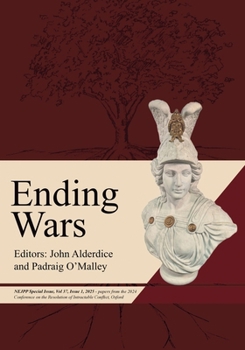Ending Wars: NEJPP Special Issue, Vol 37, Issue 1, 2025 - papers from the 2024 Conference on the Resolution of Intractable Conflict, Oxford
These are frightening times. How can we understand what is happening and can we do anything about it?Wars arise because human beings have differing desires and conflicting interests. When one group decides to impose their will on others and the victims resist, there is a conflict. If the aggressors use physical violence and the victims resist with force, the fight may escalate and last long enough to qualify as a 'war'. For much of our history, and pre-history, this is how most groups conducted their relationships with each other. Until 1945 the limits of our capacity to destroy our enemies and wreak havoc on our environment, ensured that after a violent conflict, while damage was done and many people perished, the world and humanity could repair themselves. Since the development of the nuclear bomb there can be no such reassurance. After the two World Wars it was hoped that the end of empires, the spread of liberal democracy, and the development of international law could contain the risks. For a time, the limited number of nuclear states and the recognition of the existential consequences of a nuclear war ensured a degree of restraint mediated through the development of global political institutions and international law. Today we watch with mounting fear as we see those restraints dissolving. As the months pass, ever fewer states can be regarded as liberal democracies that respect human rights and the rule of law, and at the same time human activity has increasingly impacted the adaptive systems of the natural world and damaged their capacity for repair. So, while we are faced with the prospect of both nuclear holocaust and environmental catastrophe, and only modest evidence of humanity taking either threat sufficiently seriously, the guard-rails of liberal democracy are dissolving. We are living though the most dangerous time in the history of homo sapiens. What is to be done? This multi-author volume addresses the challenge of 'Ending Wars' and is the companion volume to the recently published book on 'The Changing Character of War and Peacemaking'. Together they make a significant contribution to our understanding of the challenges of war and peace, but they also identify possible ways of understanding and addressing them.
Related Subjects
History Political Science Politics & Social Sciences Social Science Social Sciences




